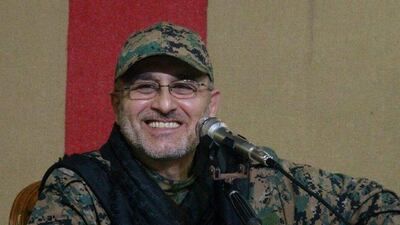BEIRUT // Hizbollah on Friday announced the death of its top military commander in Syria, Mustafa Badreddine, in an explosion in Damascus, but did not say when or by whom he was killed.
The death of Badreddine, 55, is a major blow to the Iran-backed Lebanese Shiite group, which has played a major role in Syria’s civil war.
He had been the mastermind of the group’s involvement in the conflict since its fighters joined the battle on the side of Syrian president Bashar Al Assad, according to pro-Hizbollah media. The group, along with Iran and Russia, has been one of Mr Al Assad’s strongest backers.
Hizbollah deputy leader Sheikh Naim Qassem said the result of the investigation into Badreddine’s killing would be announced no later than Saturday morning.
“We will announce in detail the cause of the explosion and the party responsible for it,” he said at Badreddine’s funeral in Beirut on Friday, adding that there were clear indications of who was behind the attack and the method used.
Announcing Badreddine’s death earlier, Hizbollah said only that he had been killed in a “strong explosion” that targeted “one of our centres near the Damascus International Airport”. Several other people were wounded, it said.
The airport is close to the Shiite shrine of Sayyida Zeinab where the group has a wide presence and several military positions.
On Tuesday night Hizbollah denied reports that Israel’s air force had targeted a convoy of its fighters on the Lebanon-Syria border.
Beirut-based Al Mayadeen TV, which is close to Hizbollah, had earlier said Badreddine was killed in an Israeli airstrike but later removed the report.
The group has paid a very steep price for its public and bloody foray into Syria’s civil war, where more than 1,000 fighters have been killed. Once lauded in Lebanon and the Arab world as a heroic resistance movement that stood up to Israel, Hizbollah’s staunch support for Mr Al Assad has been criticised at home, even among its Lebanese support base.
Badreddine was one of four people being tried in absentia for the murder of former Lebanese prime minister Rafic Hariri in a trial that is ongoing near The Hague.
The billionaire businessman was Lebanon’s most prominent politician after the 15-year civil war ended in 1990, and the 2005 suicide bombing that killed him and 22 others was one of the Middle East’s most dramatic political assassinations.
Hizbollah denies involvement in Hariri’s assassination and says the charges are politically motivated.
Badreddine’s death is the biggest blow to the group since the 2008 assassination of his predecessor and brother-in-law, Imad Mughniyeh, who was killed in a bomb attack in Damascus.
Following Mughniyeh’s death, Badreddine – known among the group’s ranks as Zulfiqar – became Hizbollah’s top military commander and adviser to the group’s leader, Hassan Nasrallah.
One of the group’s most shadowy figures, Badreddine was also known by aliases Elias Saab and Sami Issa. He was only known to the public by a decades-old black-and-white photograph of a smiling young man wearing a suit until Hizbollah released a new image of him in military uniform.
The US treasury imposed sanctions twice on Badreddine for his involvement in the Syrian war – in 2011 and in 2015. According to US officials, Mr Al Assad and Mr Nassrallah coordinated Hizbollah’s actions in Syria on a weekly basis, with Badreddine present at top Damascus meetings.
Badreddine was also known for his expertise in explosives, apparently developing what would become his trademark explosive technique by adding gas to increase the power of sophisticated explosives.
He was suspected of involvement in the 1983 bombings of the US and French embassies in Kuwait that killed five people. He was detained in Kuwait where he was sentenced to death and imprisoned for years until he fled jail in 1990 after Iraq’s Saddam Hussein’s forces invaded the country.
He is the latest in a string of prominent Hizbollah figures to be killed in Syria recently. Mughniyeh’s son, Jihad, perished in an Israeli strike that also killed other Hezbollah fighters in Syria last year while Samir Kantar, a high-profile militant who spent 30 years in an Israeli prison, was killed along with eight others in an airstrike on a residential building in Jaramana, a Damascus suburb, in December.
Sami Nader, head of the Beirut-based Levant Institute for Strategic Affairs, said Badreddine’s killling had delivered “another blow” to the group. “This has a negative impact on its constituency, its political base, its invincible image,” Mr Nader said. “It shows how vulnerable it’s getting by the day.”
Regional rivals of the Syrian president and Iran, led by Saudi Arabia, have sought to pressure Hizbollah and Lebanese authorities.
The Gulf Cooperation Council and the Arab League branded Hizbollah a terrorist group earlier this year, and Saudi Arabia scrapped $4 billion (Dh14.7bn) in military aid to Lebanon, citing the Hizbollah’s prominent role in national affairs.
The group is also under financial pressure after the United States sought to dry up its sources of funding with a law last year that imposes sanctions on banks that do business with the militants.
Lebanon’s central bank this month ordered the nation’s lenders to abide by the US regulations, prompting Hizbollah to criticize the move and ask the bank governor to reverse it.
* Associated Press, Reuters and Bloomberg

